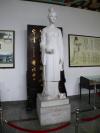Biography
Li Qingzhao (Traditional Chinese: 李清照; Simplified Chinese: 李清照, pinyin: Lǐ Qīngzhào; Wade-Giles: Li Ch'ing-chao, pseudonym Yi'an Jushi (易安居士 “Yi'an Householder”)) was a Chinese writer and poet of the Song Dynasty.
She was born (c. 1081 CE) in Zhangqiu into a family of officials and scholars; her father was a friend of Su Shi. Li was unusually outgoing and knowledgeable for a woman of noble birth.[1]
Before she got married, her poetry was already well known within elite circles. In 1101 she married Zhao Mingcheng, with whom she shared interests in art collection and epigraphy. They lived in present-day Shandong. After he started his official career, her husband was often absent. This inspired some of the love poems that she wrote. Both she and her husband collected many books. Her husband and she shared a love of poetry and often wrote poems for each other. They also wrote about bronze artifacts of the Shang and Zhou dynasties.
The northern Song capital of Kaifeng fell in 1126 to the Jurchens. Fighting took place in Shandong and their house was burned. The couple brought many of their possessions when they fled to Nanjing, where they lived for a year. Zhao died in 1129 en route to an official post. The death of her husband was a cruel stroke from which she never recovered. It was then up to Li to keep safe what was left of their collection. Li described her married life and the turmoil of her flight in an Afterword to her husband's posthumously published work, Jin shi lu. Her earlier poetry portrays her carefree days as a woman of high society, and is marked by its elegance.
Li subsequently settled in Hangzhou, where the Song government was now established. She continued writing poetry and published the Jin shi lu. According to some contemporary accounts, she was briefly married to a man named Zhang Ruzhou (張汝舟) who treated her badly, and she divorced him within months.[2] She survived the criticism of her marriage.
Only around a hundred of her poems are known to survive, mostly in the ci form and tracing her varying fortunes in life. Also a few poems in the shi form have survived, the Afterword and a study of the ci form of poetry. She is credited with the first detailed critique of the metrics of Chinese poetry. She was regarded as a master of wanyue pai "the delicate restraint".
Two impact craters, Li Ch'ing-Chao (crater) on planet Mercury and Li Qingzhao on planet Venus, are named after her.






